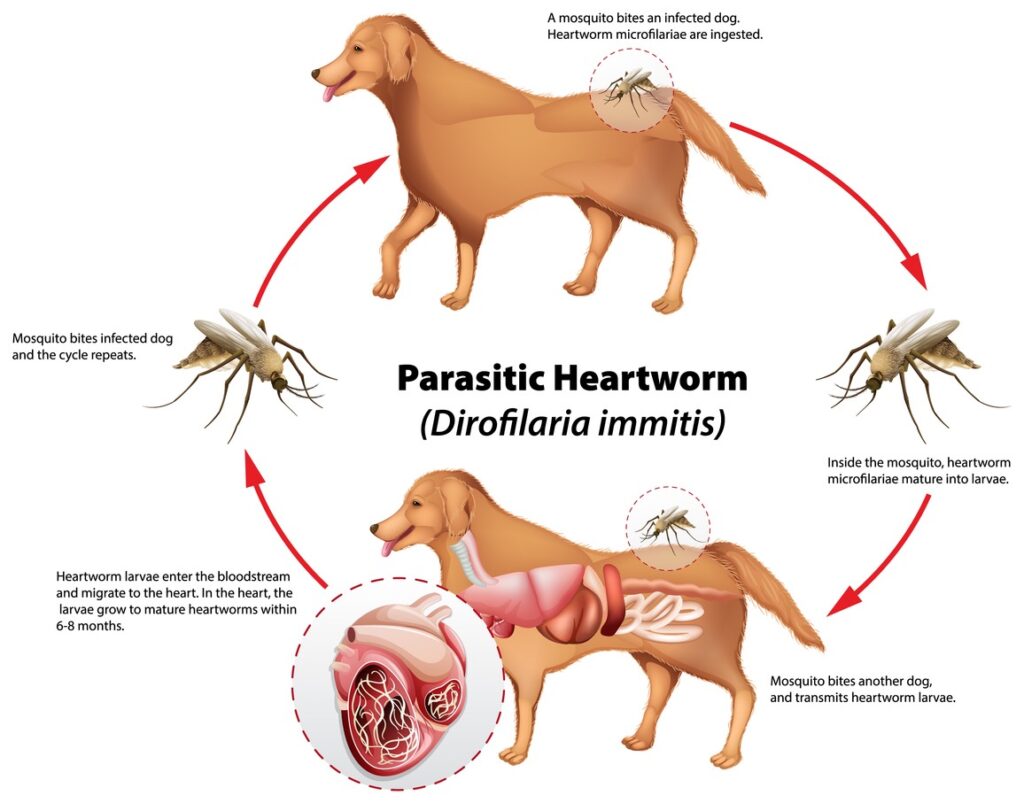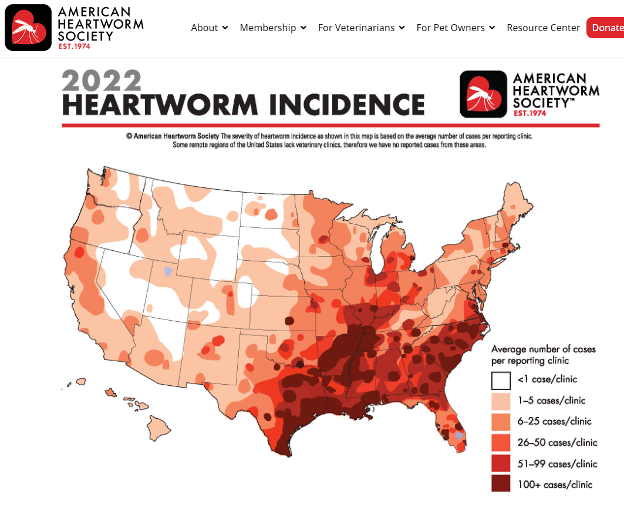Heartworm disease is a severe and often unnoticed condition transmitted through mosquito bites, posing a significant risk to pets. This blog will provide you with vital data you need to be proactive in protecting your pets from heartworms.
What is Heartworm Disease?
Heartworm disease is the result of damage done from worms living in the heart and lungs of animals. Microscopic worms called microfilaria are transmitted by mosquitos when they bite the animal. The microfilaria then migrate through the blood stream, settling in the hearts and lungs of animals including dogs, cats, and ferrets. It can lead to irreversible damage to the heart causing heart failure and even death.
The Lifecycle of Heartworms
The life cycle of a heartworm involves five stages:

- Mosquito Infection: It starts when a female mosquito bites an infected animal (usually a dog or a wild animal like a coyote or fox) that is carrying microfilariae in its blood.
- Development of Heartworms in the Mosquito: Inside the mosquito, these microfilariae mature into larvae in 10 to 14 days.
- Transmission: When the infected mosquito bites another animal, it injects these larvae into the animal’s bloodstream.
- Migration to Heart and Lungs: The larvae travel through the infected animal’s bloodstream until they reach the heart and lungs. There, they grow into adult worms over several months.
- Mating and Production of Microfilariae: Once matured, the adult worms mate and produce microfilariae, which circulate in the infected animal’s bloodstream, completing the cycle.
Symptoms and Signs of Heartworm Disease in Pets
This disease is often referred to as the “silent killer” because, in its early stages, it usually shows no symptoms or only very subtle ones. Pets infected with heartworms may not exhibit any signs until the disease has progressed to a more advanced stage. Significant damage may have already occurred to the heart, lungs, and other organs by this time. Below are the symptoms the American Heartworm Society lists for dogs, cats, and ferrets:
Dogs:
- Mild, persistent coughing
- Weakness or reluctance to exercise
- Fatigue after moderate activity
- Decreased appetite
- Weight loss
As heartworm disease progresses, dogs may develop heart failure and the appearance of a swollen belly due to excess fluid in the abdomen.
Cats:
Signs of heartworm disease in cats can be very subtle or very dramatic. Symptoms may include:
- Coughing
- Asthma-like attacks
- Periodic vomiting
- Lack of appetite or weight loss.
- Occasionally, an affected cat may have difficulty walking, experience fainting or seizures, or suffer from fluid accumulation in the abdomen.
Ferrets:
- Decreased appetite
- Weight loss
- Paralysis of the hind legs
- Enlarged abdomen
- Dark-colored urine
Unfortunately, in some cases, the first sign is the sudden collapse or death of the cat or ferret.
Diagnosis and Testing for Heartworm Disease
Early detection of heartworm disease is crucial for successful treatment and prevention of further complications.
Dogs: We typically perform a series of tests to diagnose heartworm disease, including a blood test that detects the presence of adult heartworms or their offspring. Imaging techniques like X-rays or ultrasounds can tell us the extent of the infection.
Cats: The nature of heartworm disease in cats differs in how the disease is diagnosed and managed. Because a cat is not an ideal host for heartworms, some infections resolve on their own, although these infections can leave cats with respiratory system damage. While infected dogs may have 30 or more worms in their heart and lungs, cats usually have six or fewer—and may have just one or two. However, just one or two worms can make a cat very ill. Diagnosis for cats can be complicated, requiring a physical exam, an X-ray, a complete blood count as well as blood tests. Dr. Acworth may also recommend an ultrasound.
Ferrets: Diagnosis can be complicated, requiring a physical exam, an X-ray or ultrasound exam, a complete blood count and as well as other blood tests.
Treatment Options for Heartworm Disease
Treatment for dogs involves medication, rest, and close monitoring by veterinarians, sometimes requiring surgery and hospitalization.
Unfortunately, no approved drug therapy for heartworm infection in cats or ferrets exists, and the drug used to treat infections in dogs is unsafe for them. Nevertheless, we can often help cats and ferrets with good veterinary care and preventative. The goal is to stabilize your pet and determine a long-term management plan.
Heartworm Cases in Ulster County, New York

We have found heartworm positive dogs in several areas of Ulster County. It only takes one heartworm positive dog to infect many mosquitos and continue the transmission of this disease.
According to the American Heartworm Society, the incidence of heartworm disease has continued to rise in previously known hot spots and unexpected locations with previously low heartworm rates.
The AHS conducts a heartworm incidence survey every three years, working with veterinary practices and shelters that submit data from heartworm antigen tests conducted during the previous year. The latest survey was conducted in early 2023 and reflects data from testing conducted during 2022.
Prevention and Proactive Measures Against Heartworm Disease
We cannot stress enough the importance of prevention regarding heartworm disease. Several options for preventing heartworm infection are available, including monthly preventive medication, a yearly injection, and yearly testing. Pets must have a negative test before starting preventive and be tested yearly thereafter.
Heartworm disease can significantly impact your pet’s health and overall well-being. As the worms multiply and grow within the heart and lungs, they cause inflammation, damage blood vessels, and disrupt normal blood flow. If left untreated, this leads to heart failure, organ damage, and, ultimately, death. Treating advanced cases of heartworm disease can be challenging, costly, and it may not always guarantee a full recovery. Therefore, prevention is crucial in ensuring your pet’s long and healthy life.
Regular Veterinary Check-Ups are Essential
Regular veterinary check-ups are essential for maintaining your pet’s overall health and well-being, including protection against heartworm disease. During these visits, Dr. Acworth can perform routine screenings for heartworm infection, assess your pet’s overall health, and provide guidance on preventive measures. She can also address any concerns or questions regarding heartworm disease or other potential health issues.
Indoor Pets Can Get Heartworm Too!
A common misconception is that indoor pets are not susceptible to heartworm infection. However, mosquitoes can still find their way indoors, and all it takes is one bite to transmit the disease to a dog, cat, or ferret.
Protecting Our Pets: Uniting Against Heartworm Disease
In conclusion, understanding and actively preventing heartworm disease in your beloved pets is paramount for their health and well-being. The alarming rise in heartworm cases, even in previously considered low-risk areas, underscores the importance of remaining vigilant against this preventable disease. By taking proactive steps to protect pets from heartworm, we can ensure they lead long, happy, and healthy lives free from the risks posed by this insidious parasite. Remember, prevention is crucial, regardless of whether your pets spend their days indoors or outdoors, as mosquitoes can easily find their way into our homes. Let’s unite to safeguard your furry companions from the silent killer of heartworm disease. Contact us today.
Warm Regards,
Dr. Eleanor Acworth & Team




